


Astounding Science Fiction, 1958
The 'Golden Age' of SF and Astounding Science Fiction is commonly regarded as being from mid-1939 until either the end of the 1940's or the early 1950's (the end is less well-defined than the start). However, Astounding Science Fiction in 1958 was certainly in its pomp, Campbell was in the middle of his tenure as editor, and almost all the big names in SF were publishing classic SF stories in the magazine. I recently acquired the complete issues of Astounding from this year, and reading through them is a real joy.

The 6 issues from January 1958 through June 1958 (above) feature stories from Pauline Ashwell, Murray Leinster, Frank Herbert, L. Sprague de Camp, a young Robert Silverberg, Fritz Lieber, Christopher Anvil, Gordon R. Dickson and Randall Garrett, as well as serials by Poul Anderson and Hal Clement that would both later be published as famous novels.

The July 1958 to December 1958 issues (above) contain some very famous stories from top SF writing talent, including stories from Jack Vance, Poul Anderson, James H. Schmitz, Clifford D. Simak, Katherine MacLean and H. Beam Piper as well as further tales from Christopher Anvil, Pauline Ashwell and Randell Garrett.
Astounding, January 1958
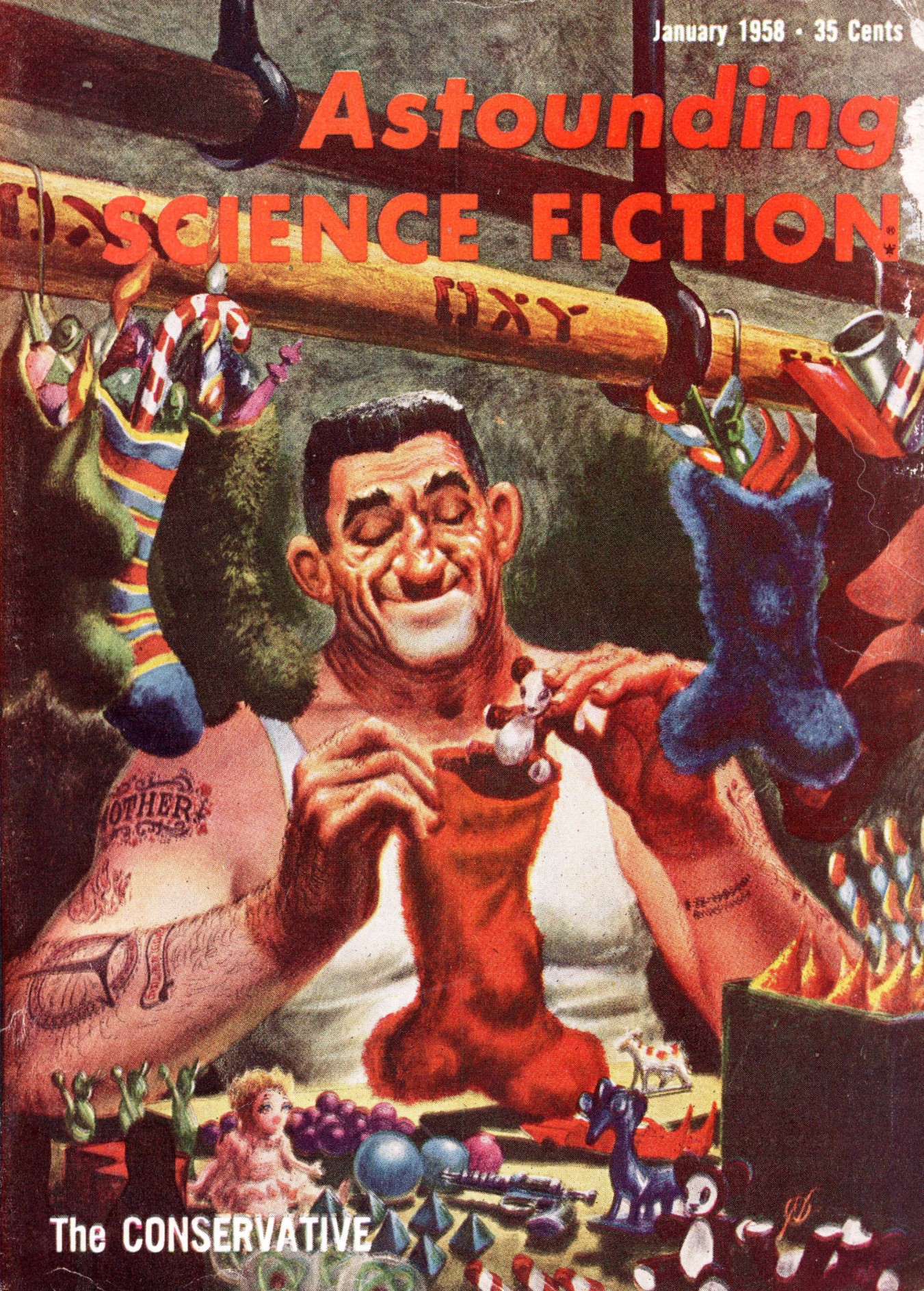
Pauline Ashwell - Unwillingly to School
This novelette was a finalist for the 1959 Hugo Award, and was the first SF publication by Ashwell, who went on the publish in Astounding/Analog Science Fiction right up until the year 2000. It was interesting to read Ashwell's first SF publication - it's written in the vernacular of a no-nonsense 'country girl' who helps her dad on his farm on a world dedicated mostly to mining. She has an innate ability to engineer behaviour in the rowdy miners and is encouraged to go to Earth (rather against her will) to attend college and study Cultural Engineering. The story gets more interesting in the latter section where Ashwell explores whether humans actually have any free-will. It seems that, like most of us, the girl might not have free-will, but she does appear to have free-won't. It wasn't a bad story, though the use of vernacular language become slightly tiring after 40 pages.
Frank Herbert - Cease Fire
This short story was included in Damon Knight's 1962 anthology A Century of Science Fiction. Concerning a chemist who's stuck in a future war (manning a forward observation post in the arctic), he has an idea for developing a bomb that could be triggered remotely through clever chemistry. The imagery in the arctic is very good and the story is well written. It's interesting to see how reminiscent (or not) this is of Dune which Herbert published 7 years later. It's not very similar in tone or language in fact, displaying less mature writing, though its not at all bad.
Murray Leinster - Short History of World War Three
Leinster had been publishing SF for 40 years by this time, and would publish for another decade yet. This story is told in a rather comic style. American forces intercept Russian military maneuvers, and ask if they can help, and offer them drinks, and so-forth. This rather undermines the Russian plans for World War III, which the American's have actually started early, in a war waged like none before it. It's quite entertaining, but not one of Leinster's best by any margin.
Randall Garrett & Robert Silverberg - All the King's Horses
Published under the collaborative name "Robert Randall", this was the top-rated story in the January '58 issue, as judged by Astounding readers, according to 'An Lab'. This was actually one of a series of Nidorian tales by Garrett and Silverberg. In this novelette, Earthmen have left Nidor, but the old ways have been lost to the native Nidorians. A new political leader of the Nidorian's, who blackmailed his way to power, proposes that the old sacred temple is rebuilt. However, he finds that once a way of life has gone, there's nothing he can do to reverse the change (as suggested by the stories title; "couldn't put humpty back together again"). This is indeed the best story in this issue - Silverberg's touch is readily apparent in the aliens, a certain sensuousness to their descriptions, and in the language and tenor of the piece. Drawing thoughtful comparisons with the real world of 'today', and the inevitability of change, this is a superior SF tale, and it's also the best written story here.
Stanley Mullen - Guppy
Mullen wrote a few dozen short stories between 1947 and 1959, and by reputation they were pretty 'pulpy' fare. This story is not great, and employs a sort of pulp-fiction hyperbole that stands out in poor comparison to the tale by Garret and Silverberg that precedes it. The story concerns an artificial brain grown in a vat, that has been nicknamed 'Guppy". DNF.
Overall thoughts
This was not a bad issue, though maybe not a great one. If it came out today, it would be a very strong issue of Analog (numerous household names appear in the one issue) but the standard was undoubtedly higher in the late '50's. The Ashwell was interesting to read, as it was her first published story, but the style dragged it down slightly. The Herbert was entertaining enough but didn't ultimately maintain its strong and evocative beginning. The best story was the 'Robert Randall' novelette, and I'd agree with the AnLab vote. The editorial by Campbell lamented the loss of the race into space, 'won' by the Soviets, and he's critical of American assumptions of technological superiority, which he dissects in a post-mortem on 'Project Vanguard'. The book reviews by P. Schuyler Miller are intriguing - Jack Vance's Big Planet was highly recommended, as was Judith Merril's yearly anthology. Philip K. Dick's Eye in the Sky received a more lukewarm response, and Farmer's Green Odyssey didn't impress Miller at all.
Astounding, February 1958
Poul Anderson - The Man Who Counts(Part 1 of 3)
This serial, featuring Anderson's galactic trader Nicholas Van Rijn, was subsequently published as a novel under several different titles including War of the Wing-Men (1958), The Man Who Counts (1978) and The Earth Book of Stormgate 2 (1980, UK). It has also been collected in omnibus editions of Van Rijn stories (e.g. Baen's The Van Rijn Method). In the story, Nicholas Van Rijn crashes in the sea on Diomedes, a planet that is twice the diameter of Earth, but with half the density, as it almost completely lacks elements beyond calcium in the periodic table. Van Rijn's group are rescued from their sinking craft by some of the native sentient beings - winged mammals with bodies rather like otters. A complication is that the humans cannot eat anything local and they must survive on their human food rations before they run out, and in this limited time, must find a way back to a human colony on the other side of the giant planet. The lack of metals and therefore technology, the biology of the flying aliens, and the character of Van Rijn, all make this an entertaining and interesting read. The serial continued in the March issue and concluded in the April issue, but I read the installments consecutively, so comments in the subsequent issues will be minimal. Overall, this was a satisfying early short novel from Anderson.
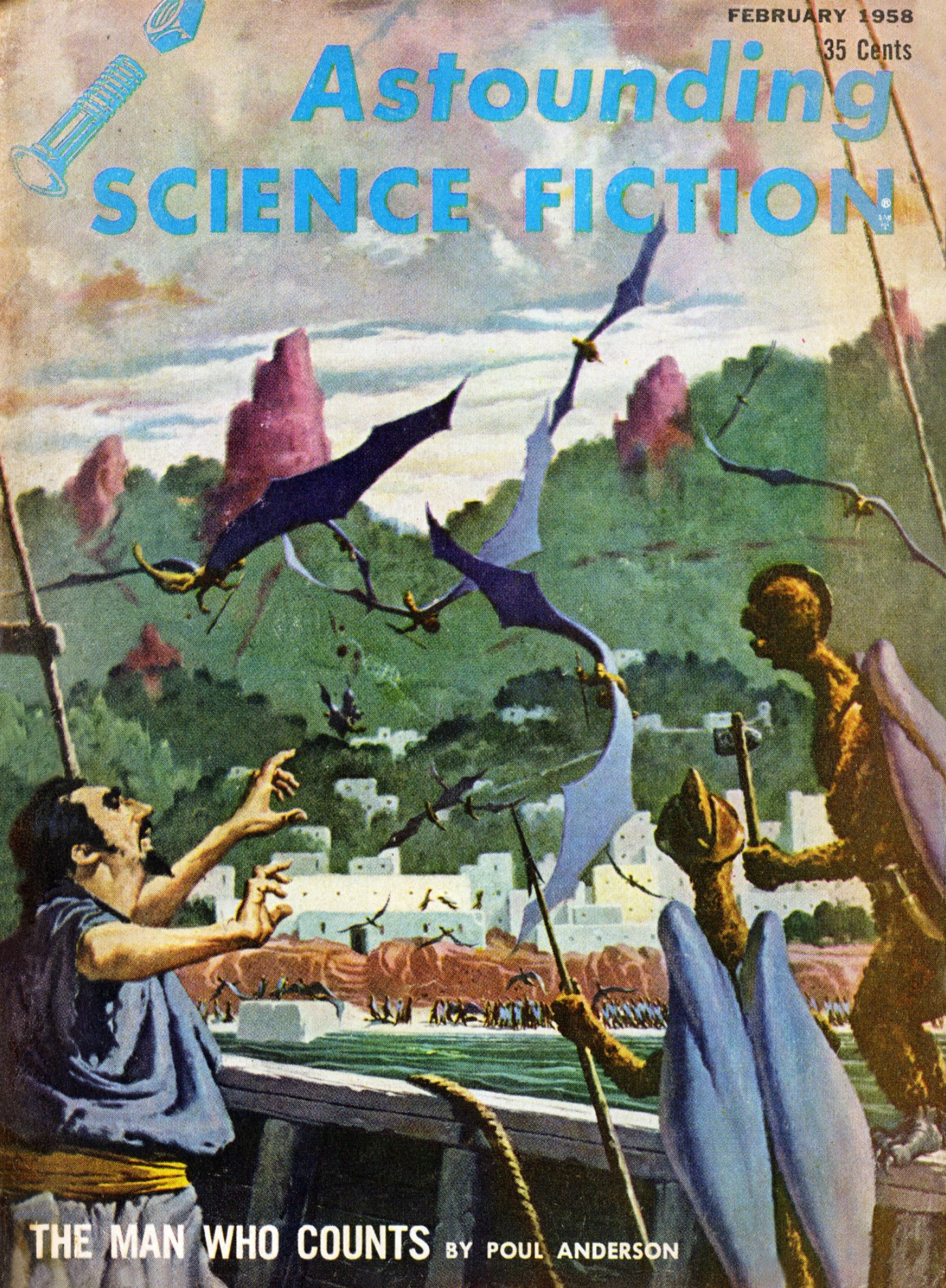
Eric Frank Russell - Brute Farce
Voted February '58 top story by readers, according to 'An Lab', and deservedly so, I would say. It's a little gem of a story, told in Russell's off-hand wry comedic style. A bowler-hat wearing 'fixer' attends to a long-running and exasperating war between two belligerent alien races, by thinking outside the square. It's well-written, engaging and entertaining, with something to say about the merits of unconventional thinking.
L. Sprague de Camp - Aristotle and the Gun
This novelette from de Camp has been heavily anthologised over the years (by Dozois, Asimov, Dann, etc.). This is a time-travel tale in which, unusually, the time traveler specifically wants to alter the time line to improve scientific progress. The protagonist travels back to ancient Macedonia, to meet up with Aristotle, who was tutoring Alexander at the time. It's a lot of fun, and also seems to be quite well researched, with regard to the classical world. A hit, from de Camp.
Robert Silverberg - No Way Out
In Silverberg's short story, overpopulation of Earth is the concern, with the Secretary General of the UN trying to convince representatives of the Mars, Calisto and Venus colonies of taking more immigrants, to relieve the pressure on Earth. I always find it interesting when I see stories of overpopulation from such a long time ago, as it clearly is a problem now, but I'm not sure how many, outside of SF writers, recognised the problem back then. Silverberg always writes well and engagingly, even in his earlier, more pulpy work, and this was an enjoyable read.
Christopher Anvil - Achilles' Heel
This issue finished with a fairly pedestrian story about a war with aliens, who work best as a collective, and as a result therefore have a vulnerability that humanity can exploit. It's a fairly well-worn trope in SF, and while it was written in a fairly engaging way, and was perfectly readable, it wasn't a great story, lacking novelty or fresh ideas.
Overall thoughts
This was an excellent issue of Astounding. Anderson's serial had a bright start, and the stories by Russell, de Camp and Silverberg were all rather good. The cover art appealed too - with an illustration for Anderson's serial, by H. R. Van Dongen, showing Nicholas van Rijn in his 'War with the Wing Men'. All-in-all, better than the January issue.
Astounding, March 1958
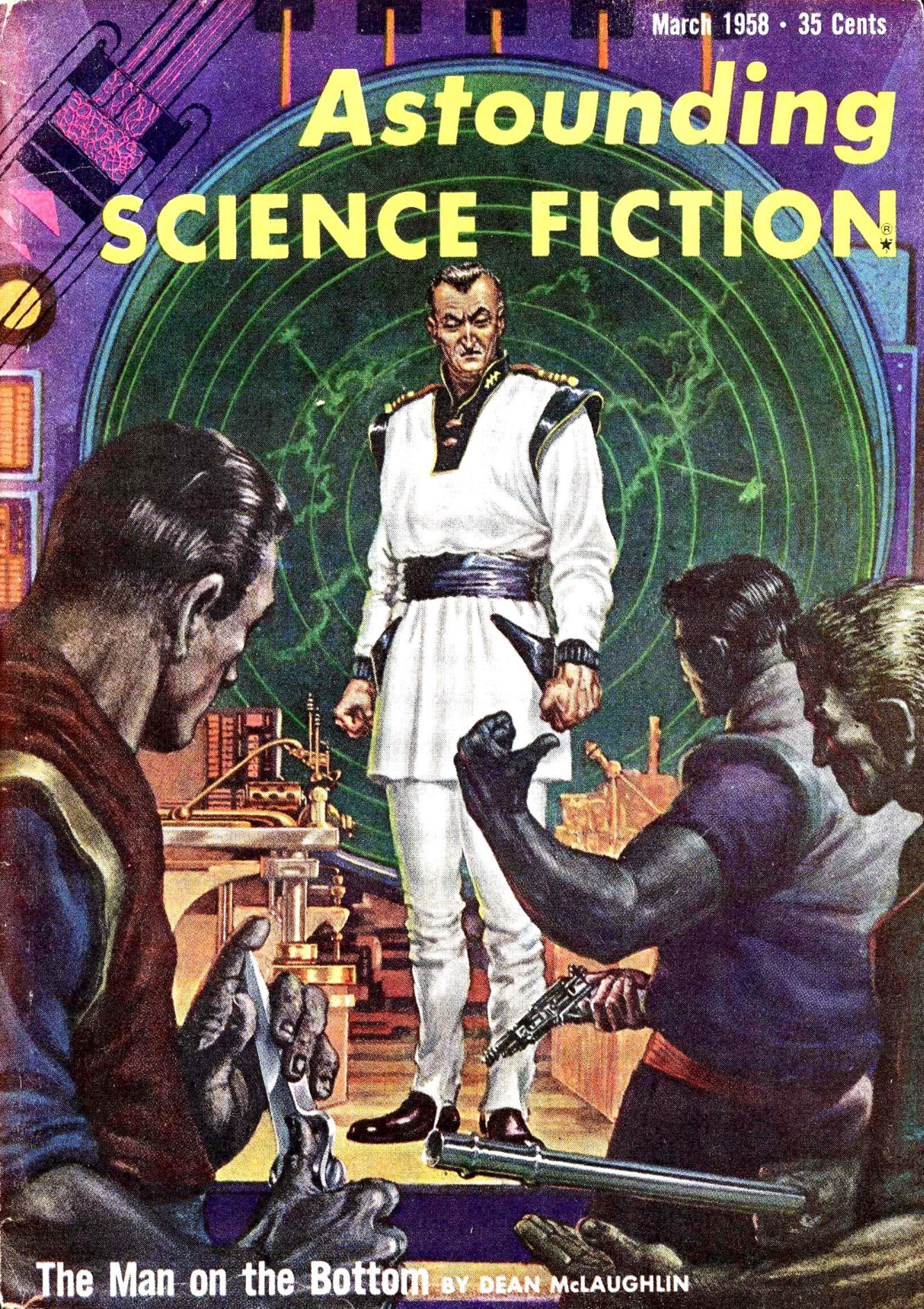
Dean McLaughlin - The Man on the Bottom
In this tale of a future Earth, many mining operations take place under deep-sea domes. When war breaks out, these domes are extremely vulnerable to nuclear attack. The only way to survive would be to not be in the war at all. In some ways this is a rather pedestrian tale, except that ultimately it has an interesting point to make, which is that the belligerents in wars are countries, not organisations or companies, and why should non-combatant civilians choose or agree to take part? So, it's philosophically interesting, by the end, and has something to say. McLaughlin (b. 1931) was interesting for having had work published in Astounding/Analog over seven decades, starting in the 1950's, and though never prolific he had the top voted novella in Analog in 1981, 1991 and 2008!
Randell Garrett - Penal Servitude
Highly prolific, Garrett was the most published author in Astounding in the 1950's, with 29 stories. This was okay, and quite entertaining. A group of political schemers plan to reinstall a past tyrant to power, while an undercover double-agent works against them to stymie their scheme. I quite liked some aspects of it, and it's quite immersive, but lacks the quality and depth of the following story.
Charles de Vet & Katherine MacLean - Second Game
An-Lab results for this issue of Astounding very clearly placed this story first, with all the other stories scoring less well and very similarly to each other. Having read the issue, I would agree. De Vet and MacLean wrote a super novelette in Second Game. A spy (and master chess player) visits the world of the technologically advanced alien race the 'Veldians'. Almost entirely like humans, the Veldians were intent on war and aggression against the human 'Thousand Worlds' alliance. But the game-playing spy has a plan to avoid bloodshed and win the seemingly unwinnable conflict. This is very well written, and clearly a notch above the standard quality of pulp SF. Parallels with humanities problems abound and the dialogue between the key characters is intelligent and engaging. Highly recommended.
The novelette Second Game was later expanded, interestingly. It's success in the short form led to the authors expanding it for a 1962 novel Cosmic Checkmate, that made up one half of an Ace Double (paired with King of the Fourth Planet, by Robert Moore Williams). The novel version of the story received further revision and expansion in 1981, when it regained it's original title Second Game.
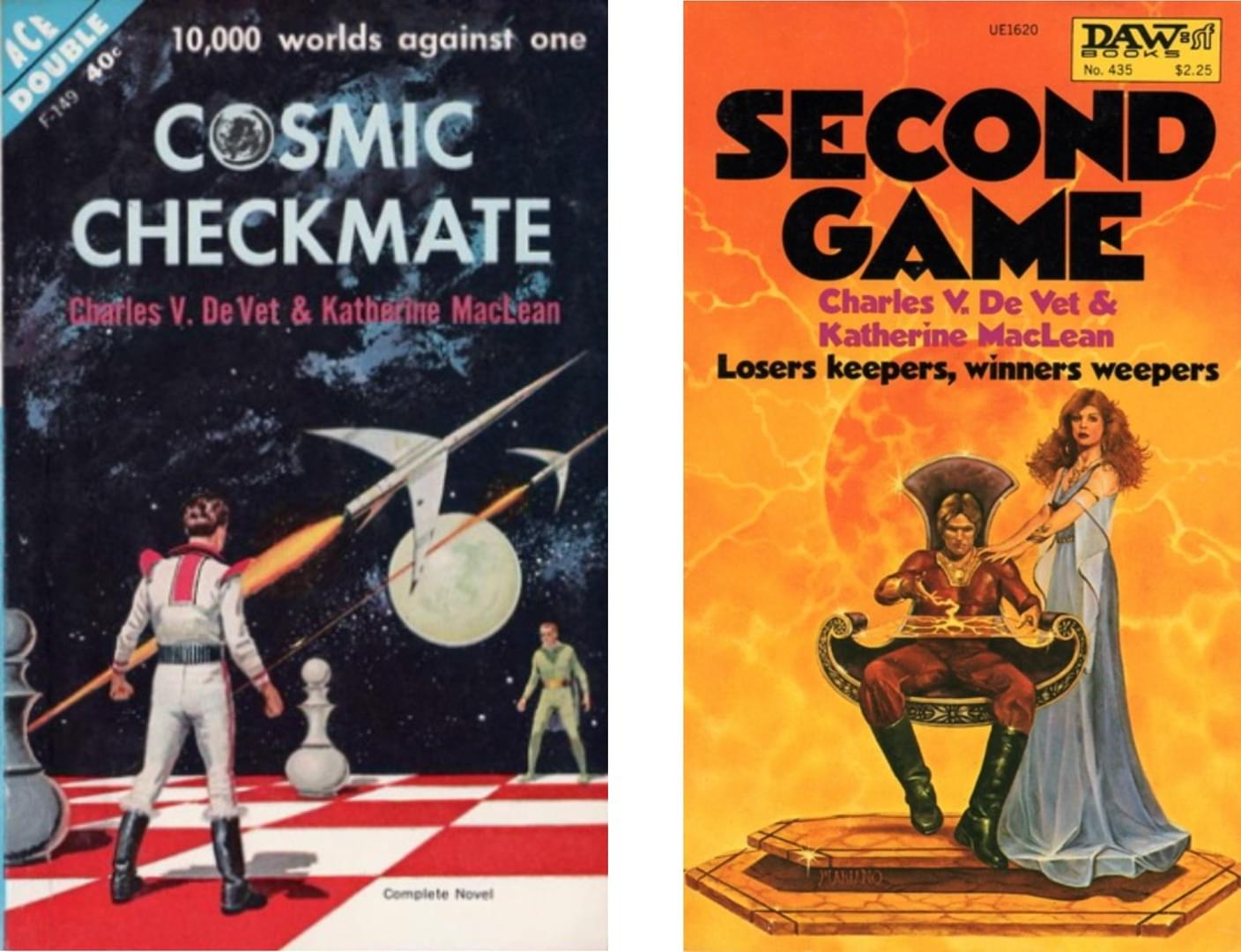
Fritz Leiber - Try and Change the Past
This was short but entertaining, outlining how a 'snake' soldier in the Change War discovered how hard it was to change his own past, due to the law of 'conservation of reality'. It's quite nicely done, the main character is a bit of a heel and it's one of those classic time travel tales that tend to stick in the memory.
Poul Anderson - The Man Who Counts (Part 2 of 3)
Anderson's serial continued in this issue. This instalment slightly lacked the interest of the previous month's opener, but it was still entertaining, and was shaping up for an interesting conclusion in April.
Overall Thoughts
This was a good issue. The editorial wasn't all that engrossing (Campbell was still smarting about the poor performance of America in launching a satellite, relative to the Russians), and P. Schuyler Miller's book reviews didn't comment on books I was that interested in. But the stories were good, and it was a decent issue. Perhaps not quite as consistent as February, but probably better than January, and the long novelette by Charles de Vet & Katherine MacLean was really good.
Astounding, April 1958
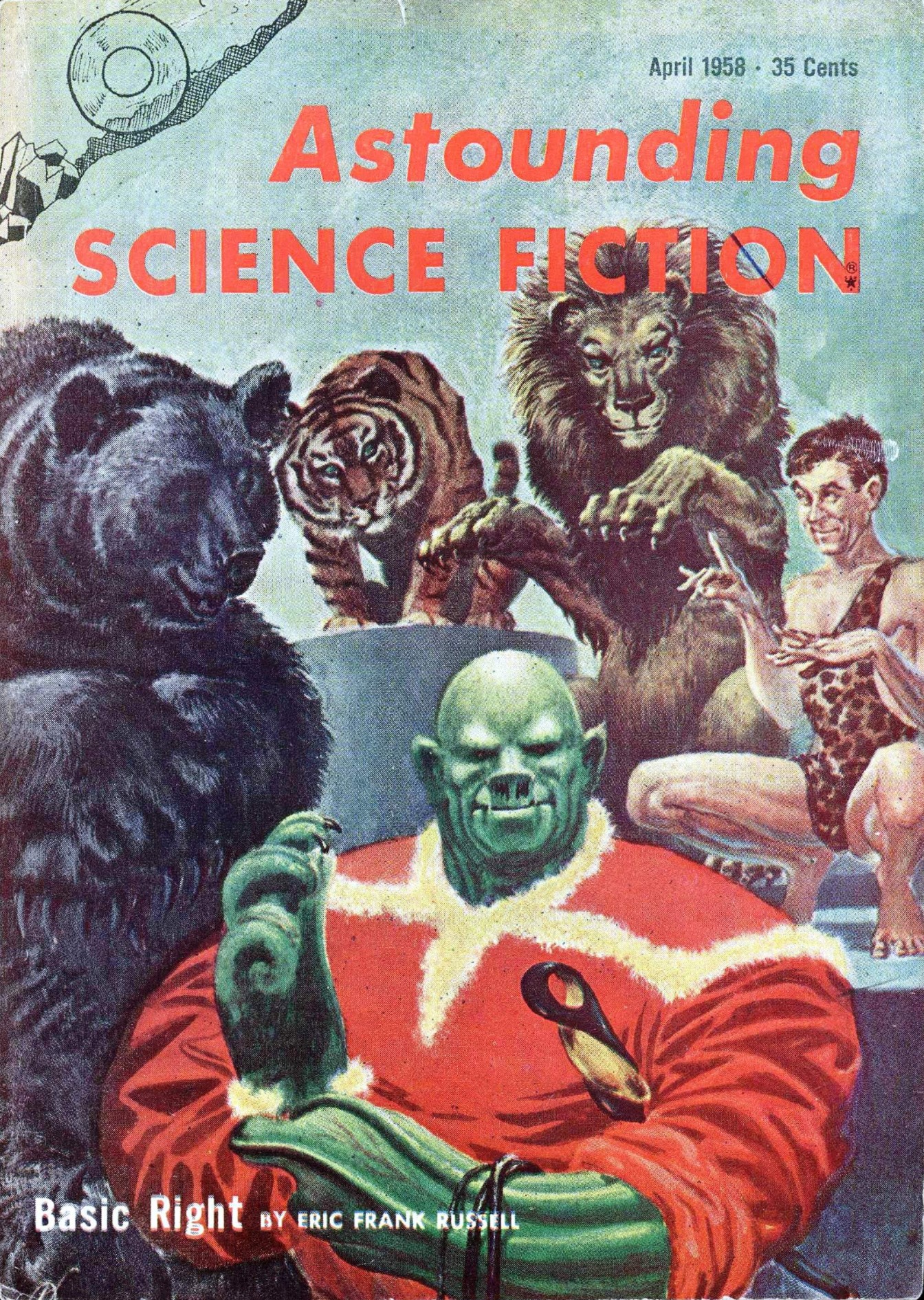
Eric Frank Russell - Basic Right
Russell was back in the pages of Astounding, following his entertaining story, Brute Farce, in Feb '58. In this novelette, Earth is taken over by the alien 'Raidans' (the green race gracing the magazine's cover, by Kelly Freas). But rather than battle against subjugation, humanity accepts the takeover with complete equanimity. It's a reasonably nifty idea, I guess, but one can't quite imagine humanity presenting such a well coordinated ruse. This was less good than his Feb' story.
Jon Stopa - A Pair of Glasses
Stopa was essentially a fan writer, I understand. Hailing from Chicago, he wrote only a few stories in 1957-58, and another in the '80's. He was more associated with fandom and known for his work supporting WorldCons. This story, set in a dystopian future was quite well written but turned into a philosophical discussion, and wasn't very interesting. DNF.
Christopher Anvil - Revolt!
As with Russell, this issue saw Christopher Anvil back, with a novelette, giving April a not dissimilar lineup to February. This was hugely entertaining, with a battle of wits played out between an planetary development agency, who want to initiate a mining operation post-haste, and the local military commander who wish to take fewer risks on the high gravity planet. Revolt! was actually the first story in Anvil's long-running Federation of Humanity sequence, which has since been collected by Baen Books in two Interstellar Patrol volumes. Anvil wrote these stories between 1958 and 1978 (and with one last story in 1990).
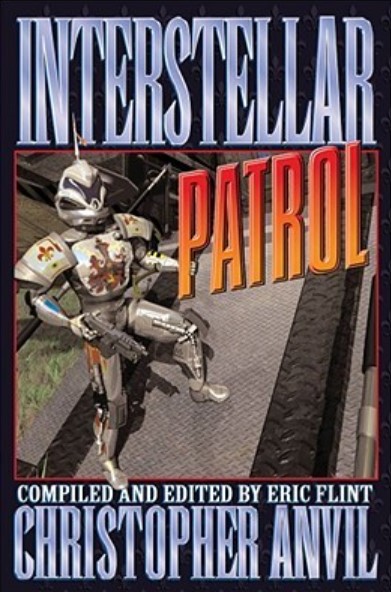
Poul Anderson - The Man Who Counts(Part 3 of 3)
Anderson's serial concluded this month, and it was a satisfying end to the tale. The world-building was good, and van Rijn carried the show with entertaining bluster and bombast - frustrating and annoying to his fellow characters, but not to the reader, which is a sign of considerable writing skill.
Overall Thoughts
This was perhaps a slightly weaker issue than March, though it was no means bad. The Anderson serial concluded well, but took up a good deal of space, so there was only the three other stories (though two were quite lengthy novelettes). Both of these, the Russell and the Anvil, were entertaining, with the latter probably being the standout story this month. 'An-Lab' results published later in the year agree with me, which also placed the Stopa in last place. There was an interesting letter from Isaac Asimov in Brass Tacks, that critically considered American anti-intellectualism. In book reviews, Schuyler liked the new Andre Norton (Sea Siege) as well as the new Hoka book, Earthman's Burden, by Poul Anderson and Gordon R. Dickson. He was less complimentary about People Minus X by Raymond Z. Gallun, Hidden World by Stanley A. Coblentz, and particularly disliked Ayn Rand's Atlas Shrugged.
Astounding, May 1958
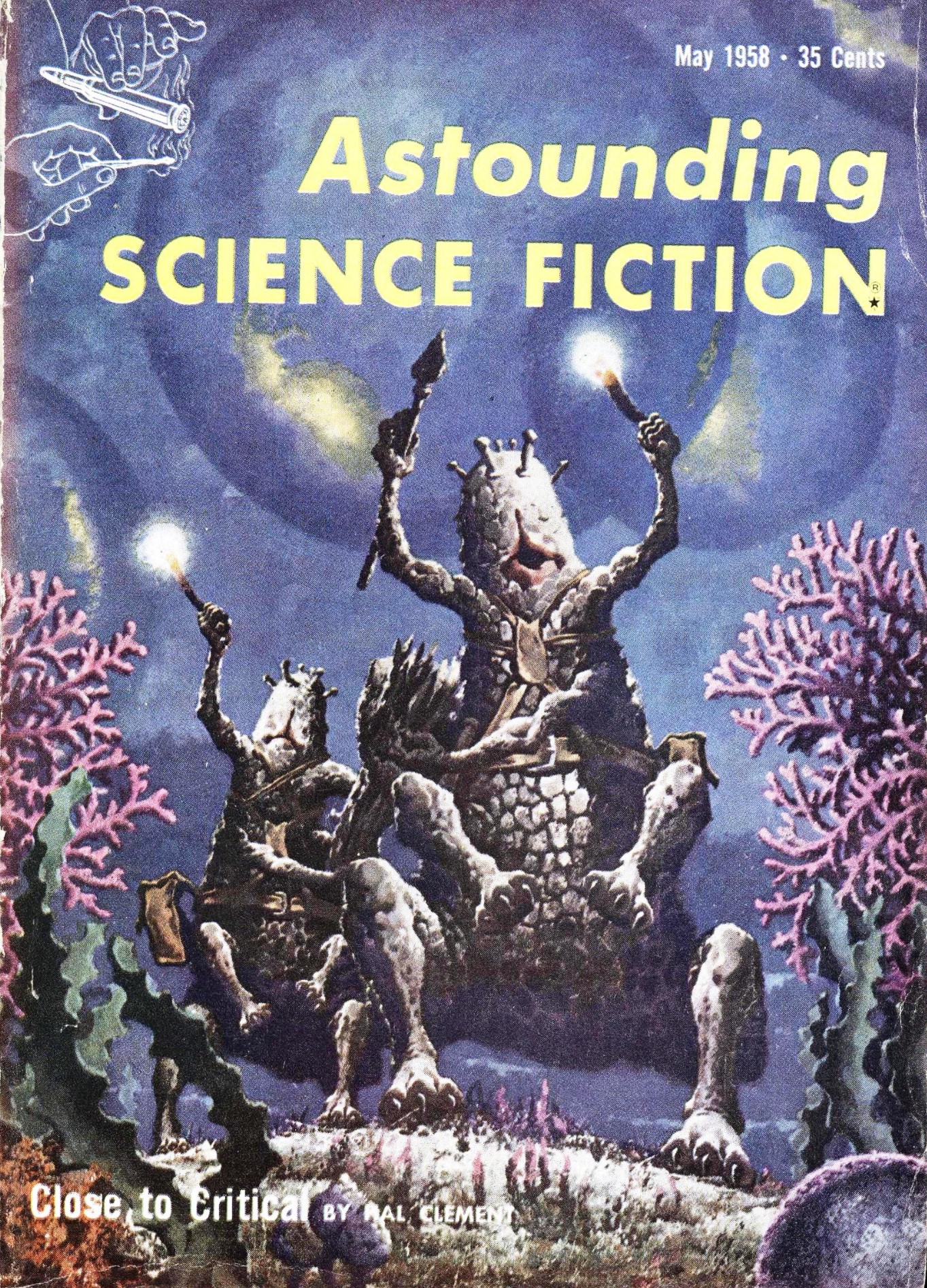
Hal Clement - Close to Critical (Part 1 of 3)
As with the Poul Anderson serial that ran from Feb-Apr in this year's Astounding, I read all three parts of this Hal Clement novel directly after each other. This story is typical Clement, as the concept is based on the nature and challenges provided by a very un-Earth-like planet. In this case, the planet has a high gravity (approximately 3-4 G), surface temperatures of about 380 ˚F and extremely high atmospheric density (approximately 800 atmospheres). The end result is a world in which water is a superheated liquid with a density very similar to the air, and which that falls each night as slowly descending 50-foot raindrops. Living on the planet are 8-legged sentient beings at a stone-age point of development. A robot was sent to the planetary surface by human researchers circling the planet, and this robot 'raised' a collection of the indigenous 'people' to act as go-betweens for the humans and rest of the population.
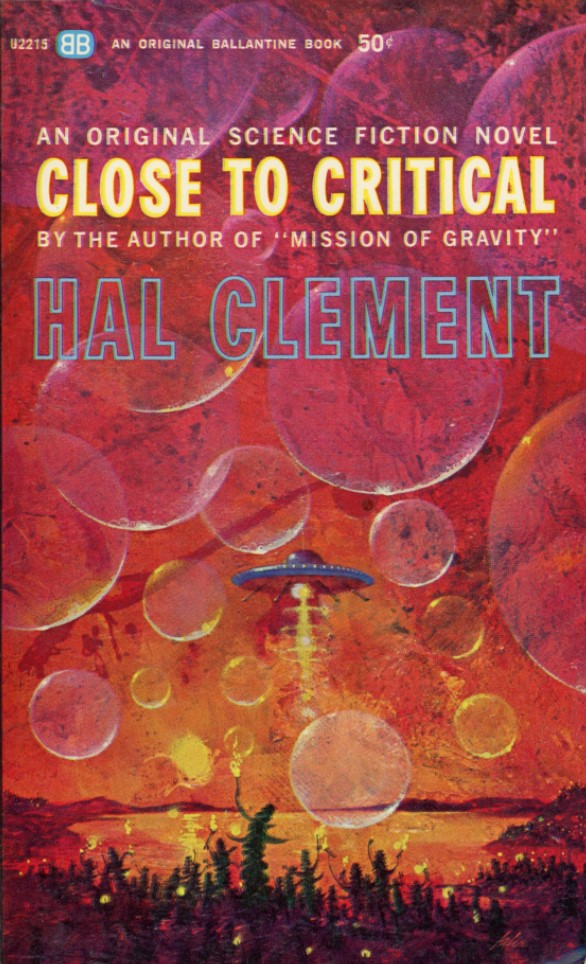
Set against this 'hard-SF' background, a shuttle craft crash-lands on the planet with two children on-board, and with no apparent way to get back into orbit, it takes the help of the natives to solve the problem. This serial started rather ponderously in this May issue, with lots of background, rather confusingly presented, and not a lot of excitement. It improved somewhat in the following issue, but ultimately ended rather weakly. It's strength is the concept of the planet, but this is not enough to sustain a novel-length serial, which was otherwise rather sterile. It didn't seem reasonable that the robot could raise the natives, the relationships between different aliens was simply not that interesting and the kids who had to be rescued were paper thin characters we don't care about that much. Characterisation was not one of Clement's strengths, as others have noted before, and overall this was not an especially good story. The illustrations by H. R. van Dongen were pretty nifty though.
Gordon R. Dickson - The Question
This was great. A small band of humans are on the retreat on an inhospitable rocky world from a full platoon of the alien race they are warring against. The men hole up in an armoured and defendable redoubt in the mountains, but they don't have supplies to last for long and one of their number is wounded. The dialogue, pace, and alien setting is all well handled, making this highly readable and engaging. Dickson rarely seems to trip up in his tales, which tend, like this one, to have something to say about humanity's warlike nature and strength of purpose. This tale explores how the men all come to the same conclusions and implacable aims, each from completely different philosophies, suggesting there is an essential truth we all understand, even if we get there in different ways.
Charles V. De Vet - Special Feature
De Vet came up with a corker of a novella in his collaboration with Katherine MacLean in March '58. In many ways, this continues his purple patch, as its a neat idea, and is engrossing and exciting. A viscous predatory alien, from a catlike race, lands in snowy Minnesota and immediately starts to attack and feed off the people of St Paul. Taking a disguise, the alien masquerades as a human woman and holes up in a hotel between her ventures outside to feed. But unknown to her... she's on camera! A vast number of cameras cover city streets and the interiors of buildings, and a TV company leaps into action to accept responsibility for the alien from the police, and film her every move. The idea of the media assuming a role in dictating morality and being inescapably everywhere was ahead of its time, and seems prescient now. The only downside to this tale is the degree of sexism, which sticks out these days like a sore thumb. But that aside, and taking this as a '50's SF tale, it's still superior. Perhaps a further collaboration here with MacLean would have smoothed the rough edges off on that front, which would have made this a potential classic.
Frank Herbert - You Take the High Road
In the far future, a great human interstellar empire broke apart from war, and led to many worlds regressing and then redeveloping in isolation, until they are rediscovered by new imperial investigators, seeking to reconnect lost worlds. One investigator on a seemingly peaceful world brings in a specialist as he doesn't trust that the people of the rediscovered world are genuinely peaceful. The idea is better then the execution, and would have benefitted from greater depth and world-building, perhaps in a longer tale. Overall, it's a little so-so.
Stanley Mullen - Fool Killer
An innocent man, convicted of murder is sent to work in the asteroid belt - effectively a death sentence from radiation poisoning - and after a few years there he is given the news he has cancer and has a month to live. He learns the State are going to overturn his conviction and pardon him, but it's too late... until he's given a new chance at coming back to life through experimental medicine. At this stage, the tale takes a dramatic turn. Having started as a fairly typical SF story off-world, it turns into a stone cold classic of SF drama and speculation. A computer is given the job of deciding the right justice for his unjust incarceration. It's deemed fair that, as he paid the price for a murder he didn't commit, and no-one can take that pain away, he now gets one 'free murder' he can commit without penalty. Will he kill anyone, how does everyone react to him, is he safe? The concept and exploration of ideas through SF here is absolutely top-notch. This is, I think, a classic SF story, though I'd not heard of it before, and makes an entry into my top 50 SF short story list. An absolute blinder.
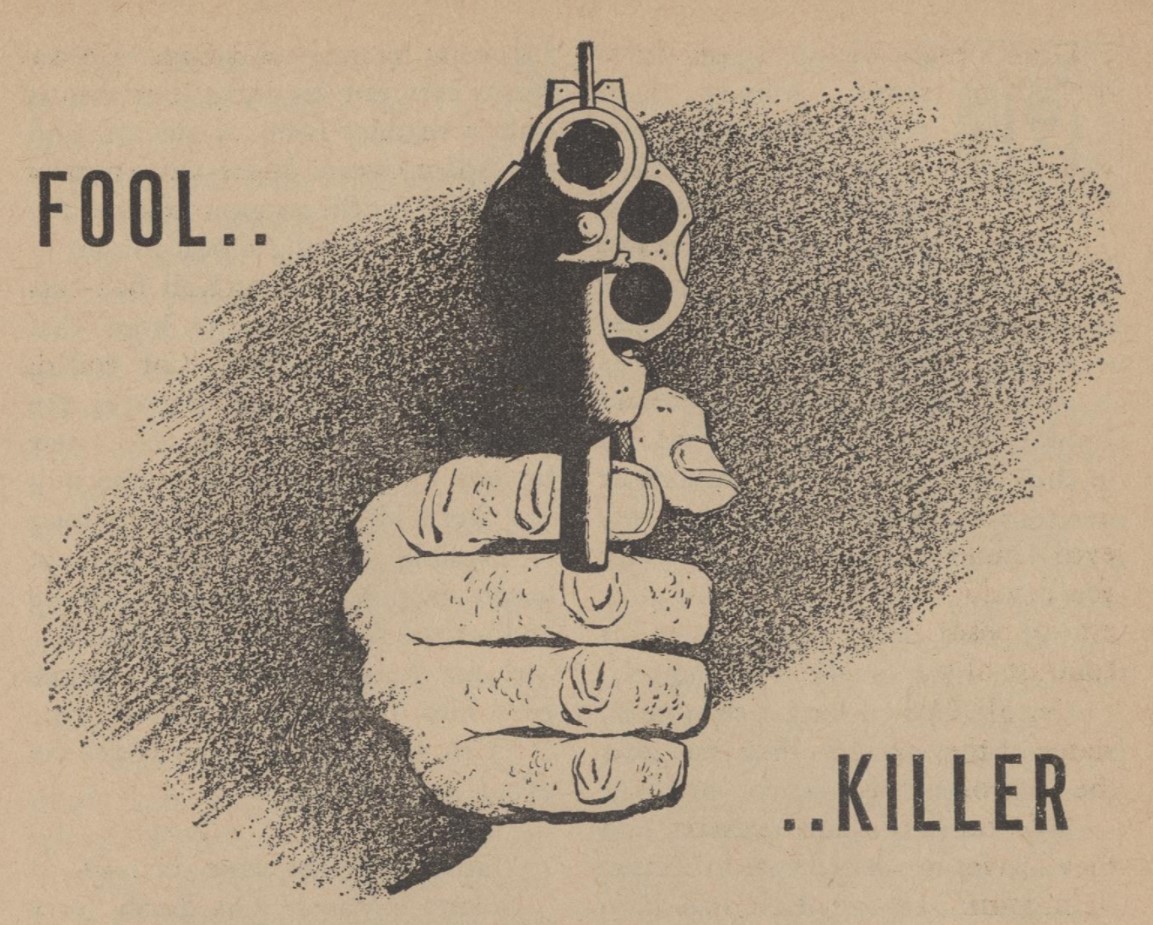
John T. Phillifent - One-Eye
This was written under the pseudonym John Rackham, a name used by John Phillifent several times. I'm not sure why he would necessarily use a pseudonym here, because it's really good. A huge, strong, man of limited intelligence, a little like Lennie in Steinbeck's Of Mice and Men, can see into the future a few seconds ahead, prior to any violent injury occurring to others. But whenever he tries to warn people, they see him as a jinx, or the culprit of the accident. It's well written and an engaging premise. The idea presented here is that having any skill or ability outside the norm wouldn't necessarily be a good thing.
Overall Thoughts
This was a cracker of an issue. The serial was perhaps the weakest piece of fiction in it (with perhaps the exception of the Herbert), as the stories by Dickson, de Vet and Phillifent were all strong, good reads with great ideas, and the Mullen was exceptional. Overall, this was certainly the strongest issue of Astounding so far from '58. There was an interesting poll result feature toward the back that showed the demographic breakdown of Astounding readers. It made fascinating reading, especially as it recorded separate statistics for men and women. Looking at educational level, 47.2% of male readers and 47.7% of female readers were college graduates (the same) and of these 21% of men majored in a physical science, and 17% of women in physical sciences. The interesting differences come in education and biological sciences - both clearly higher for women -and in engineering which 29% for men majored in, and which no women undertook. Clearly engineering was still a bastion of male bias. Overall, 88% of reader poll responders were male.
Astounding, June 1958
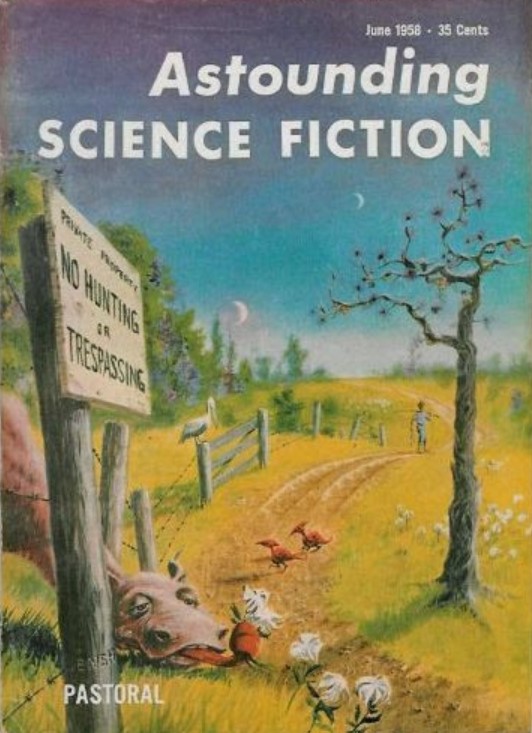
Robert Silverberg - Heir Reluctant
This issue of Astounding starts with a good length novelette from Silverberg. To suggest he was prolific around this time would be profound understatement: in 1958 alone he published 6 short novels and 65 short stories! Knocking them out considerably faster than one story a week might suggest the quality would be poor, but pretty much everything he wrote was bought and published, and this novelette confirms that Silverbob's minimal standard was higher than many of his contemporaries. Heir Reluctant has not been anthologised anywhere, so its unlikely to be among his best work, and yet... it's really quite good. A colony world is shaping up for revolution if the governor from Earth doesn't confer home rule on the colonists. But the governor is quite Machiavellian, and his plans run deeper than the colonists imagine to bring about orderly change. The premise is good, and the characters are well developed. The end is signaled some while before it concludes, so Silverberg doesn't quite nail the landing, but it was a fluid and enjoyable read nonetheless.
Stanley Mullen - Space to Swing a Cat
Mullen's tale in the previous issue was a corker, so I was interested to read this story. While Fool Killer was not nominated for any awards, this tale was actually a finalist for the '59 Hugo. That said, it's not as good. Different animal species have been experimentally mutated to express intelligence, so they can act as pilots in space. The improved reflexes and single-mindedness of different species are explored (dogs are too stupid, lions too lazy), and it's found that tigers are optimal. The story concerns the relationship between a test pilot and his 'tiger' trainee near the rings of Saturn. It's ultimately a bit so-so.
Randall Garrett - No Connections
This starts by presenting several interesting ideas, including dialogue discussing the potential to predict the future by the mathematical analysis of billions of people, which sounds a lot like a critique of Asimov's Foundation stories. It then turns into a story about a scientist who is trying to establish, archeologically, that Earth was the cradle of humanity, tens of thousands of years ago (again, similar to Asimov's 'Empire'). But then it ends with a whimper, with what is effectively a joke.
Theodore L. Thomas - The Law School
Very brightly and engagingly told, but ends up being nothing much at all. A man from a moon work crew is arrested for fighting, and defended on Earth by a young new lawyer, who turns the case on its head. Rather average.
Hugh B. Brous, Jr - Murphy's Law
The 'Brass Tacks" readers pages in Astounding around this time devoted a lot of letters to 'Murphy's Law', and this may be why this short piece was published by Campbell, as its all about what went wrong on a first trip to the moon. Told in a folksy, blasé fashion, the events are not remotely sensible, and the end is beyond daft, suggesting this was just a joke, but it's not a very good one. Brous published only this one SF story, until the early 1980's, when he published a couple more.
Hal Clement - Close to Critical (Part 2 of 3)
The second part of Clement's serial was where it dragged rather. See previous month review for the full assessment of this hard science fiction serial.
Overall Thoughts
This was not nearly as good an issue as the previous, excellent month, and the Silverberg novelette was probably the high point of the magazine. The book reviews are not of anything very interesting either, and nothing especially stood out for Miller. Campbell's editorial on science fans was quite agreeable.
Astounding, July 1958

Jack Vance - The Miracle-Workers
Vance's novella The Miracle-Workers reads as fantasy at the start, but by mid-way reveals its SF credentials, and by the end has become an intriguing study of Arthur Clarke's law that sufficiently advanced scientific development is indistinguishable from fantasy. On a colony world, the settlers have been resident for 1600 years, but have forgotten all the technology that got them there. Their technology (which they feel is superior to the 'old miracles') is based on telepathic control through 'jinxmen', that looks like voodoo. Once the overall scheme is understood by the reader, the story picks up well, and the pacing and ideas are solid. In other words, its a good deal better by the end than one expects from the start.
Christopher Anvil - Top Rung
This is a bit of fluff, really. Anvil can write good work, but he was also the provider of 'filler' for the magazine, I think. The diea here is that a leader, however eccentric, must be driven to anxiety by the fact that he has reached the top rung on the ladder and has nowhere to go. An ambassador to an alien leader provides a solution. This would be one to skip, if you were reading through this year's Astounding issues.
Ralph Williams - Business as Usual, During Alterations
This tale by Ralph Williams is not his most highly regarded (in the sense of awards won), as his story Cat and Mouse was a finalist for the 1960 Hugo, but it is perhaps his story most often referenced and anthologised. The tale explores what happens to the economy when an alien race introduce a disruptive technology - in this case a duplication device. The ideas were perhaps novel at the time, but the ramifications to the economy of such a device seem pretty obvious now. Moreover, one can't help thinking that the protagonist (the manager of a department store) acted like a complete fool when he first got hold of the technology. It was quite clear what would happen, yet he needed a psychologist to point out the obvious. In short, it may be a bit of a classic, but it hasn't really stood the test of time.
Hal Clement - Close to Critical (Part 3 of 3)
Clement's serial concluded this month. As mentioned above, the third and final part was a little better than the somewhat stodgy middle. Overall, this was rather a middling quality serial for the time.
Overall Thoughts
Not perhaps the best issue in 1958, though not quite the worst either. The Vance novella was ultimately enjoyable, and the serial conclusion was reasonably entertaining. The short stories sandwiched between were a bit ho-hum, however, so it's far from being a classic issue. There's an interesting special review from Campbell of Atlas Shrugged by Ayn Rand, funnily enough. The Analytical Laboratory results in October '58 tell me that contemporary readers agreed with my assessment of the stories this month - placing the Vance top, and the Anvil bottom by some margin.
Astounding, August 1958
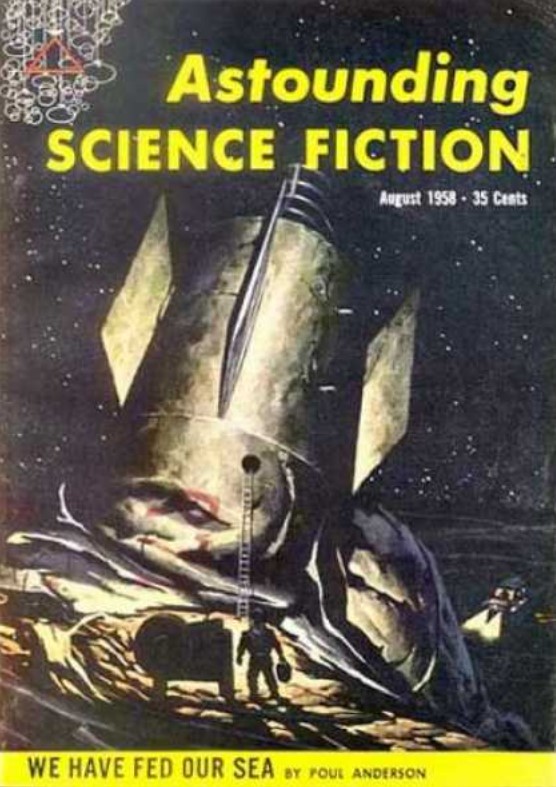
Poul Anderson - We Have Fed Our Sea (Part 1 of 2)
In August 1958 Poul Anderson was back with another serial in the magazine, following his serial in Feb-Apr earlier in the year. We Have Fed Our Sea was a popular serial in Astounding and only one year later it was published as the short novel The Enemy Stars. I read The Enemy Stars recently, so, while I enjoyed it very much (it's one of Anderson's stronger early novels), I did not re-read it in this read-through of the magazine. The story revolves around a lost spaceship, with engine trouble, that cannot easily get back to known space. It's early 'hard' SF and very nicely done. A few years ago on the SFF Chronicles forum I wrote: "Enjoying it immensely, and but for the occasional mention of using slide rules, it would stand up today as great hard SF. It really doesn't come across anachronistically, which I've noticed before with Anderson. The other thing that comes through clearly is Poul's intelligence. His mind was like a steel trap, and I'm in awe. It's in a different ball-park entirely from many lesser (and many current) popular SF authors. Highly recommended, especially if you liked Tau Zero and similar SF disaster type books."
Anton Lee Baker -
They've Been Working On
This was a weak story, about how 'stupid' computers can be, and how a train depot becomes clogged with immoveable stock because a computer couldn't work out a simple solution. Very dated. This was the only SFF fiction the author ever published, so while it was poor, I can now say I've read the entire SF output of Anton Lee Baker.
Christopher Anvil - Cargo for Colony 6
Anvil can write quite good stories, though his prolific output for Astounding, especially, was mostly of the filler type, and this effort was no different. The cargo for a space colony, during a period of unrest or war, is discovered to be a new kind of star-drive which responds to thought. The plot is rather a muddle, and Anvil seems to have been trying to add depth or mystery by not explaining things well. Overall, this wasn't much good, and readers should feel they can skip it.
Robert Silverberg - Point of Focus
The issue ends with a Silverberg, which is often a high point in the magazine; even his earliest work back in the late 1950's was of a reliable minimum standard. This story is in some ways quite ordinary for Silverberg, but it does rise in quality by the end. An alien emissary of the 486-world Federation goes to a planet with an exotic chlorine-based atmosphere and indigenous sentient species to bring them into the Federation. When he gets there, he finds a Terran population has beaten him there and is persuading the chlorine-based locals not to join. The story isn't all that much, but it's a nice example of an early argument for diversity and differentiation between people.
Overall Thoughts
Not the best issue, if one looks beyond the excellent entry from Poul Anderson (which I'd previously read). In The Reference Library review article, P. Shuyler Miller provides an interesting overview and review of C.S. Lewis' famous SF trilogy.
Astounding, September 1958
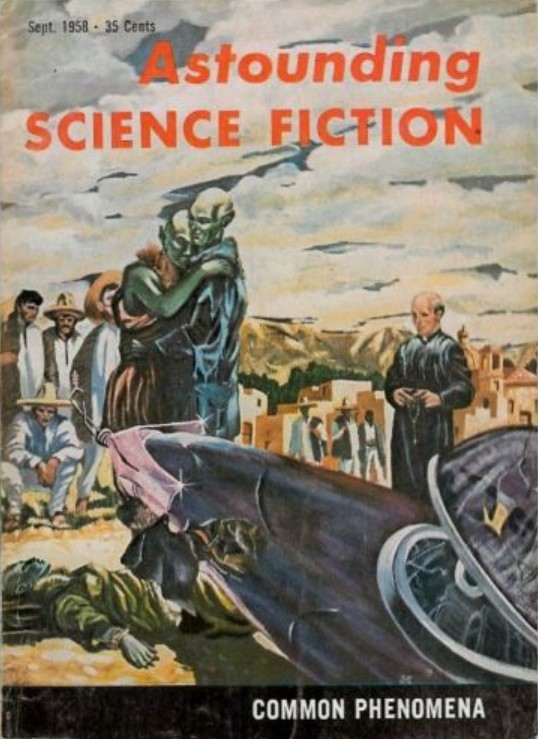
Christopher Anvil - Foghead
Like many of Anvil's works, this novelette is very uneven; it starts patchily and is somewhat confusing, then gets a whole lot better for a while, but ends rather abruptly. The human race is fighting another force in the galaxy (who are never described), with the help of two alien races. A ship is sent to a world to set up a receiver for ships using a new worm-hole style instantaneous means of starship travel. When they arrive at the planet to place the receiver, they find the place is not only extremely foggy, but full of dangerous flora and fauna. Anvil always gives the impression he's writing his work in a rush - there's little sign of his taking care with plot, pacing or explanation.
Gordon R. Dickson - The Quarry
This was much better, and read like a classic of the genre, given its terrific idea. To say too much would give the plot away, and its a pretty short story. Suffice to say, a man is being 'played with' by two children, much to his despair. The reason why is the classic invention of this tale. I'm surprised it's not been anthologised more, and it's the sort of thing that would be very well known if Asimov had written it (it's just the kind of thing he would write). In any event, Dickson very rarely disapoints - he's was a terrific SF writer.
James H. Schmitz - Harvest Time
Schmitz is most well known these days for the Witches of Karres novel and sequels, but he wrote a lot of short SF before he wrote those novels. I find my feeling about Schmitz is mixed. His writing tends to be a little unreliable, I feel, and this novelette is borderline acceptable, but develops character and plot less smoothly than one would like.
Daniel Luzon Morris - Interview
Representing the only SF Morris ever had published, this was seemingly inspired by a news item in the Manchester Guardian
, regarding the removal of an oak tree planted by Merlin. In this story, Merlin is interviewed in the present day and reveals that many technological insights of past times were seen as magic, and that knowledge from different eras was not necessarily less correct, just seen through the lens of the times. It wasn't bad, but nothing to write home about.
Avis Pabel - Basic Agreement
Is another unique offering, as this was the only SF published by Pabel. A little girl is visited each night by a tentacular green monster, but her father is not impressed by her constant nightmares and tells her to pull herself together. It nice enough, though of course it's hardly that original.
Poul Anderson - We Have Fed Our Sea(Part 2 of 2)
The conclusion to Anderson's superior tale of outer-space misadventure concludes. It's a cracking read.
Overall Thoughts
The highlights in this issue were the Anderson serial conclusion and the Dickson short story. Dickson is remarkably consistent I find, and it was no surprise his was the 'best of the rest' after the serial. Schuyler-Miller's book reviews are quite interesting; he was much in favour of Wyndham's The Midwich Cuckoos and waxes lyrical about PKD's short story collection The Variable Man. In his editorial, Campbell goes on about political systems, and what America currently has (in 1958) - it's pretty skippable.
Astounding, October 1958
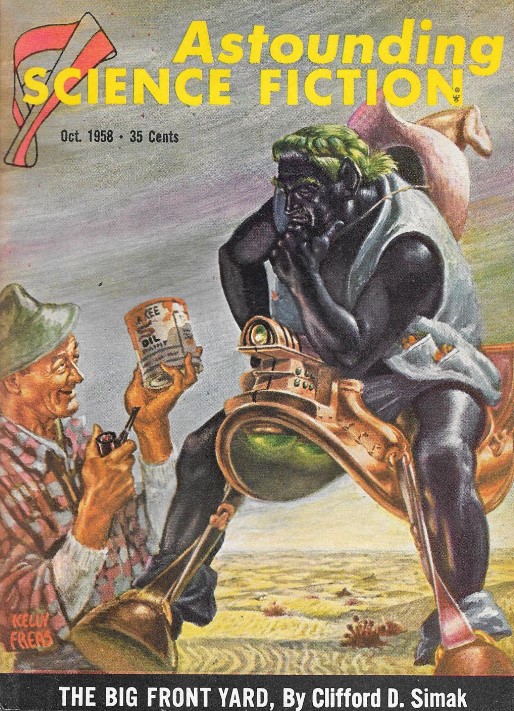
Clifford D. Simak - The Big Front Yard
October '58 kicks off with a genuine classic, which I'd been looking forward to getting to in this read-through (albeit as a re-read). Given a famous Kelly Freas cover - which perfectly captures a scene in the tale - Simak's story won the 1959 Hugo for best novelette. A Yankee tinkerer, fixer of gadgets and antique dealer finds machines are being mysteriously mended in his old house overnight or while he's away from home. He later discovers the front of his house and yard disappears, and he can only get in by the back door! He comes to realise he's been visited by beings from another world, and his house has become the gateway to new horizons. The tale is a quintessential rendition of Simak's common theme of a small-town everyman's interactions with aliens, and how old traditions and values might not lose their merit, just because times change. Great fun, and of course highly recommended.
Rog Phillips - The Yellow Pill
In researching the author for this note, I discovered that Phillips' SF was extensively published from the mid-40's until about 1961, with over a hundred short stories to his name. This tale has been heavily anthologised, including inclusion in Kingsley Amis' highly regarded Spectrum anthology series. This tale asks the thorny question of how can we know that what we see and hear is reality or merely subjective? This is the kind of idea PKD and others wrestled with, and this is a classic take on the theme. Well written, pacy and fun - even if you can see the conclusion coming - it's a bit of a belter.
Pauline Ashwell - Big Sword
As written by "Paul Ash", a pseudonym Pauline Ashwell chose to use here. There is an assumption that female writers felt they had to use male names to sell their work and succeed in SF, and this may be true sometimes, but I doubt any pressure came from Campbell here, though he tends to be the targeted for criticism for this kind of thing. The editor clearly liked Ashwell's work; he 'discovered' her after all, and published her work prior to this under her own name (and many other women under their own names). In any event, this novelette is quite an inventive and enjoyable tale about a colony on an alien planet, and their interactions and understanding of a small, telepathic, alien lifeform. Ashwell's ideas tended to be somewhat brighter than her prose, which could verge on the sluggish, however. This was highlighted a little by the next story in the issue.
Randall Garrett - ...And Check the Oil
Garrett's story is written in his usual peppy, engaging style, and it was more immediately readable than Ashwell's. A large spaceship has settled to Earth on an Indonesian island, and various world science and linguistic experts, including the protagonist - a chemist - are brought in the try and understand why it's here, and whether the inhabitants can be conversed with. It's certainly entertaining and a nice idea, though the ending is a bit on the negative side, I guess. A decent novelette though.
Jay Williams - False Image
This was quite a good short story. Told from the perspective of an alien farmer on Earth, we learn by the end what the state of the world is, and how humans see the aliens. But the different perspective is well done, and you don't see it all coming., so the end is quite satisfying. Williams wrote a dozen or so adult SF stories between '54 and the '70's but was perhaps most well known for his Danny Dunn children's SF series (co-written with Raymond Abrashkin).
Overall Thoughts
This was an excellent issue of Astounding, possibly only matched this year by May '58. If you see copies of Astounding from this year in a used book store, grab this one as it won't disappoint. Book reviews this month include Leinster's Out of this World (described as a pot-boiler).
Astounding, November 1958
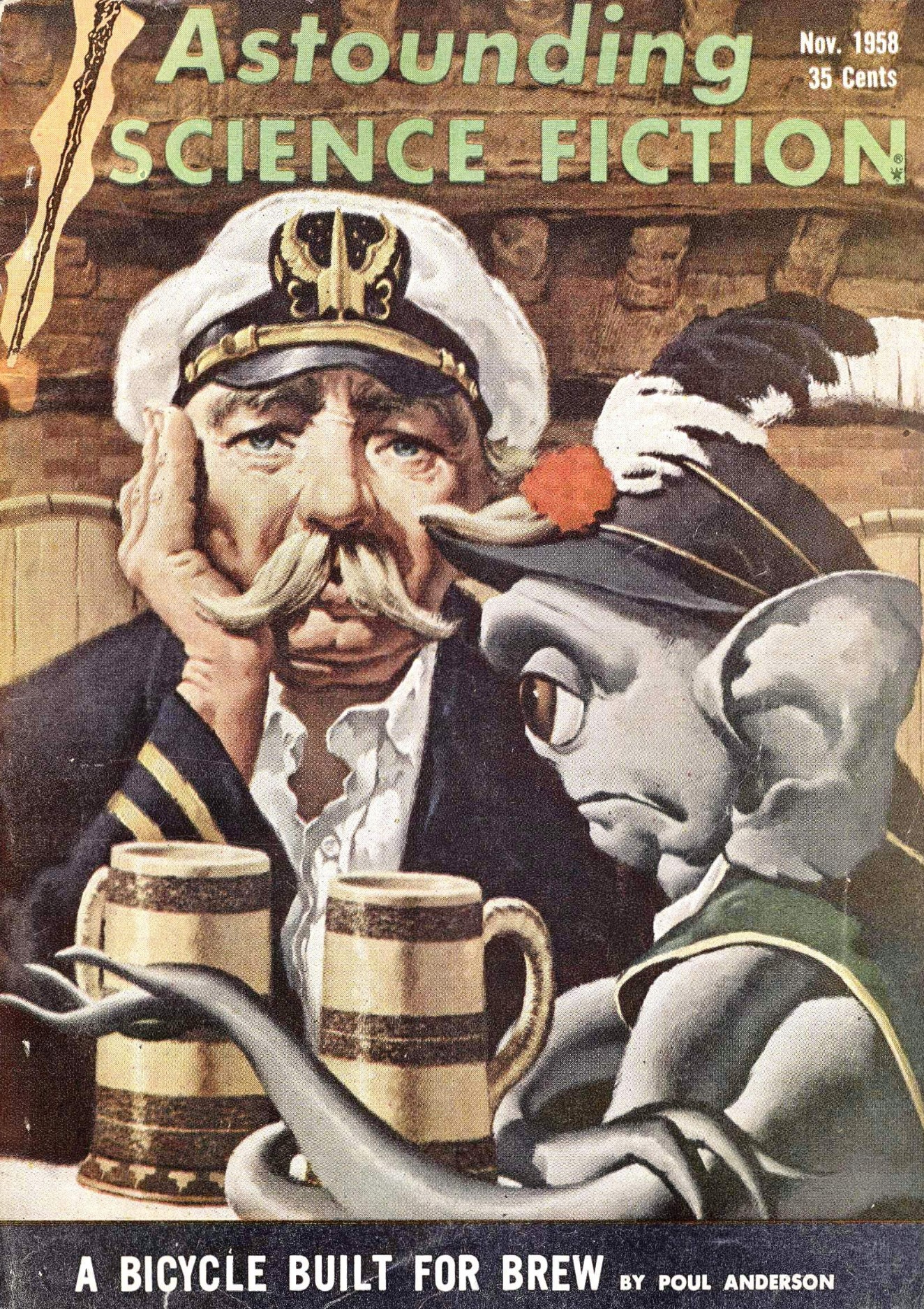
Poul Anderson - A Bicycle Built for Brew (Part 1 of 2)
Anderson's best work is his serious SF or his richly imagined fantasy. This two-part serial is a humorous SF tale which fails to engage the reader and is one of the few things I've read by the author which I've struggled to get through. Interestingly, this long novella is one of the least 'collected' of Anderson's SF stories, perhaps suggesting that posterity agrees with my critical assessment.
Christopher Anvil - Goliath and the Beanstalk
This was actually a fair bit better than some of the other tales published in Astounding in '58 by this author. Two human diplomats of the Terran Empire accompany an alien mission to subjugate an independent human world. The nature of the subjugation and response is not the main attraction here, so much as the manner of speech and communication between the human diplomats and the aliens, which is rather neat.
Andrew Salmond - Stimulus
This novelette reaches far but doesn't quite match its ambition. When humans attempt to land unmanned vessels on the moon, they discover that the vessels immediately explode upon touchdown. The same thing occurs when attempts are made to land on any other planet in the solar system. It seems that the Earth is made of 'contra' matter (a kind of antimatter) to everything else in the solar system. The tale then takes up from the perspective of the alien race who artificially made it this way to prevent mankind's expansion throughout the galaxy. It's rather a cheerleader piece for how great humans are, and runs out of steam after a fairly bright start.
Gordon R. Dickson - Gifts
An 'everyman' called Jim is visited by a man who spirits into his house and announces that he is an alien with an offer for mankind. Jim has been chosen as a perfect representative of humanity to decide whether they should accept the ability to have whatever they desire, to ease the burdens of the hard life so many face of Earth. Like most work by Dickson, this is a superior little tale, well-written and engaging.
Katherine MacLean - Unhuman Sacrifice
This is a decent novelette by the reliable MacLean. A missionary priest has been sent to a far-flung alien world to convert the primitive population. He is accompanied by two much more prosaic space ship engineers who believe the missionary was sent so far to get rid of him. But the primitive sentient lifeform they encounter has an apparently self-defeating tradition of entering adulthood from childhood in a ritual that kills many of them. The reveal at the end is quite well done, and the writing is better than average for the magazine.
Overall Thoughts
A decent issue, once one had skipped through the Anderson serial, with the Anvil, Dickson and MacLean all worth a read. Also of note was the science fact article, which this month was provided by Isaac Asimov, entitled Our Lonely Planet. He provides a lot of interesting data about the number of stars and their density and then posits a rationale for why we haven't (yet) encountered any alien races visiting us. Asimov is always readable, and this was no exception.
Astounding, December 1958
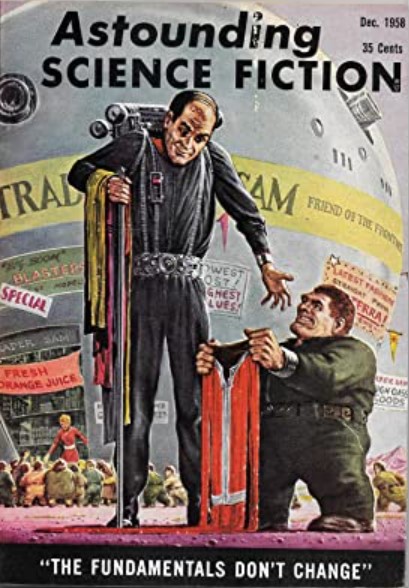
H. Beam Piper - The Ministry of Disturbance
This novelette is part of Piper's 'Terro-Human Future History' that includes such novels as Little Fuzzy and Ullr Uprising. It's quite entertaining, telling the tale of the Imperial Emperor dealing with a scientific breakthrough and student protest. It's too episodic and inconsequential to be of much note, however.
J. F. Bone - Triggerman
The triggerman of the title refers to the army general who lives in a bunker, with his had on the nuclear 'button'. In this case a genuine white button. He refers in thought and speech to the enemy as "Ivan" and he must keep his cool while all around panic at the appearance of an unusual 'missile'. It's not badly told, but neither is it a stellar SAF story. It's very much of its time in the cold war of the late '50's though, which made it quite interesting reading from a historical/sociological perspective.
Mack Reynolds - Pieces of the Game
The day after reading this I had trouble remembering it, which tells all you need to know, perhaps. It's barely SF; a spy enters Switzerland to visit Vienna (now part of the new nation sometime in the future) and gets away with his mission on account of his small stature, essentially. Very skippable.
Randall Garrett - The Queen Bee
This was kind of fascinating to read, in the same way it's hard not to look at a car crash on a highway as you pass by. It's quite engaging and well written (Garrett could certainly write well enough) but the theme of a reduced colony crew having to work out how to populate a new planet was awkwardly explored to say the least. One colonist is a strident and unpleasant women with a spoiled child complex. She is punched and slapped on numerous occasions by one of the men to bring her into line and behave. In the end she is given a lobotomy so they can breed with her without having to put up with her anti-social antics. She is a murderer, it has to be said, but the storyline the author has spun provides an opportunity to exploit unsavory treatment of the woman in a way that looks to appeal in quite a base way. It's very dated, let's just say!
Christopher Anvil - Seller's Market
Anvil again. That's 5 story entries in the last 6 months of '58. He was a scribbler, and no mistake. This tale is set on a frozen alien planet and concerns a war between humanity and the 'Outs'. Like much of the stuff you got from Anvil its not up to much to be honest.
Poul Anderson - A Bicycle Built for Brew (Part 2 of 2)
This was rapidly skimmed through, see comments for November, and so no further comments to add here.
Overall Thoughts
It was quite a readable issue, to be fair, but that's testament to the reliability of the writing of Piper and Garrett, more than the quality of the stories. As SF, this was not a great issue - in fact one of the weakest of '58, which was a slight shame to end on. The cover is interesting: it's a 'pictorial essay' by Ed Emswiller, and isn;t actually related to any of the stories in the issue. I can;t help wondering whether Campbell initally agreed to publish a story it illustrated and then it was withdrawn, or he changed his mind. In any event it was unusual.